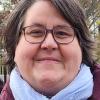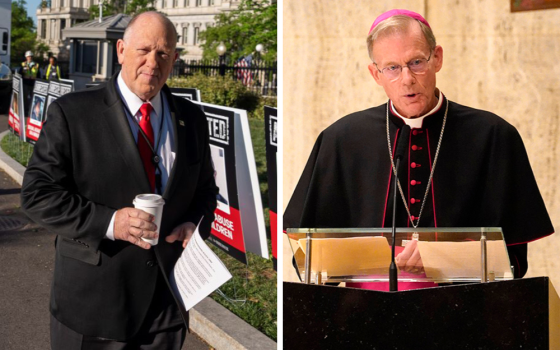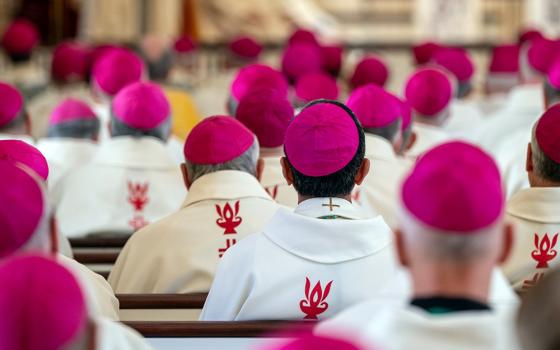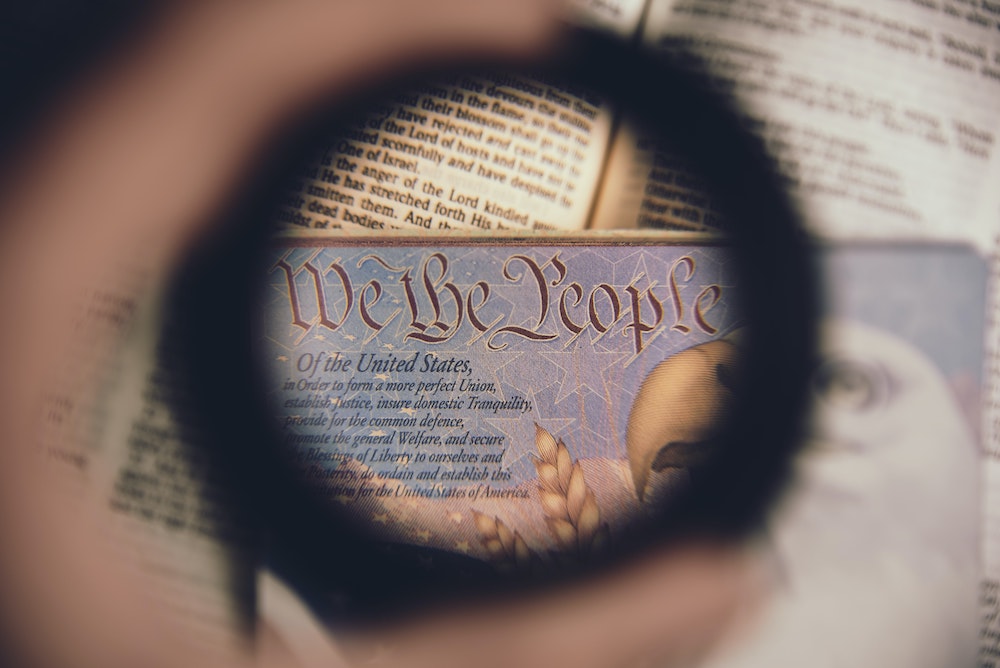
Preamble to the U.S. Constitution as seen on a U.S. passport (Unsplash/Anthony Garand)
First of all, it might be good to know, as you read this column, that I wrote these words on Tuesday evening, a few hours before the polls closed on the 2020 general election. This was intentional. I knew that my column was scheduled to be published the Friday after the election, and I did not want my words to be influenced by the outcome of the election, whether that be known or unknown, contested or uncontested, in line with my own vote or not.
You see, this is a love letter to our democracy, our imperfect collective experiment in government for, by and of the people. No matter what the results of the election, I pray for our nation and all its people, present and future. I deeply believe in the power of representative democracy and in the values that have helped us, generation after generation, to live into the dream outlined in the preamble of the U.S. Constitution—"to form a more perfect Union, establish Justice, insure domestic Tranquility, provide for the common Defense, promote the general Welfare, and secure the Blessings of Liberty to ourselves and our Posterity."
Advertisement
Over the years, we have thankfully grown in our understanding that this applies to all the people, not just some. It is my hope that we continue to grow in our understanding that we are responsible for one another. That's what democracy is all about.
Free and fair elections are key to how this works, and elections have always been a central part of my own life. During the early years of my childhood, my father was a local elected official in Prince George's County, Maryland. Some of my earliest and most vivid memories involved the electoral process. I remember going door to door, holding the hand of my mom or an older sibling, as we passed out leaflets. To this day, the smell of hot chocolate brings to mind the memories of staffing the polls with my mother on Election Day, stamping my feet to stay warm as we passed out campaign literature, at the appropriate distance from the polling place. I loved to work the polls because A) I got to hang out with my mom, and B) I got to drink all the hot chocolate I wanted to help stay warm.
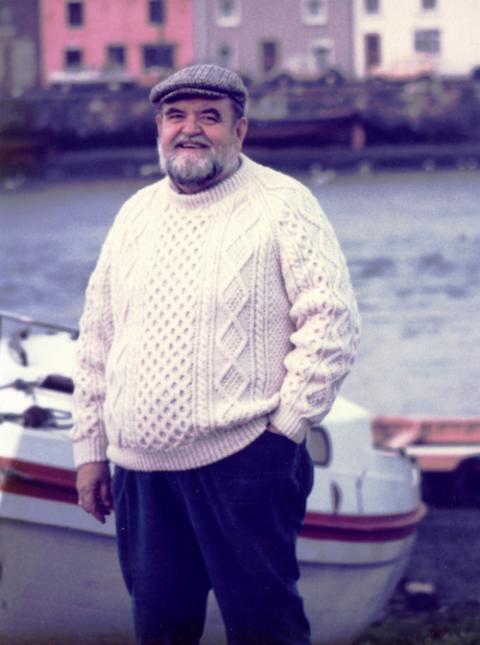
Francis B. Francois (Wikimedia Commons/mdfrancois)
As I got older, my dad retired from elected office and turned to other forms of public service. My mother worked on Capitol Hill for two elected officials, one a member of her own political party, the other a member of the other major party. What mattered to her most was the values of the elected official and their commitment to serve the common good and, in particular, the most vulnerable.
It is perhaps not a surprise that I studied political science in college and volunteered on a few political campaigns. My first real job out of college was in the office that managed local elections. By the time I made the life changing decision to enter religious life, I had served as city elections officer in Portland, Oregon, for eight years.
This position was one of the greatest honors of my life, to be the filing officer of record responsible for facilitating free and fair elections in my city. It was my job to explain how the process of running for office or filing an initiative petition or referendum worked. I was responsible for ensuring that election laws were followed and to provide public access to records. I collaborated with the county elections officials who managed the voting process. I helped to create a system of publicly funded campaigns, which as it happened ran into some kinks and my being named Rogue of the Week by the local newsweekly, just a few months before I left to join the convent. (Yes, it's true. The internet still has proof.) That last bit was a rough patch, but it did nothing to tarnish my love of our democracy and belief in the need for free and fair elections. Before I entered religious life, I even looked into becoming certified to be an elections observer in countries where democracy is fragile.
I share this personal history as a backdrop for what I'm about to say.
I am worried for our democracy. I never thought that, in my lifetime, our civic discourse and political environment would make me worried about my own country's fragile democracy. Whatever the results of this election, I am worried. Whatever the results of this election, I am committed to helping to heal the divisions and build common ground.
In 2016, I joined the Nuns on the Bus tour, traveling from Wisconsin to the Republican National Convention in Cleveland, Ohio. On the streets outside the convention center, we passed out free lemonade and asked delegates and others three questions:
1) Who is it difficult to talk to about politics with and why?
2) What worries you about this election?
3) What gives you hope for our nation?
Answering the first two was easy, whereas the last question generally stopped folks cold. They had to pause and really think and dig deep.
"Everyone eventually was able to find some hope in the midst of our fear-filled political climate," I wrote at the time:
Some answers were again ideological and focused on their preferred candidate's stump speech. But there were other, frequent answers of the genuinely hope-filled variety. More than one person pointed to young people committed to a better future. A number of answers expressed some faith in our nation's values, principles and foundations.
Four years later, our political climate is both frostier and on fire. Yet I am even more convinced that the biggest need is for us to answer this question about hope, across political, and even church, divides.
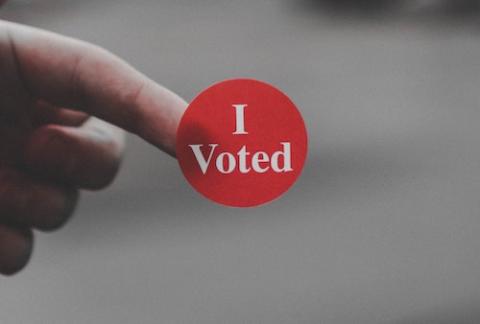
"I voted" sticker (Unsplash/Parker Johnson)
This year, the Nuns on the Bus tour was, of course, virtual due to the pandemic. I participated in five Spirit Filled Voter Town Halls. Night after night, I found myself grateful for these ordinary folks who want to be able to have difficult, but civil, conversations. I was blessed by encounters with people, voters, who know that business as usual is not getting us very far. I learned about the call to focus on abundance, to listen deeply, build relationship, and be the "connective tissue" that holds us together.
We the people can be that connective tissue. Whatever the results of the election, we can and must build common ground, talk about our shared values, ask curious questions, learn from differences, and continue the project of building a more perfect union.
[Susan Rose Francois is a member of the Congregation Leadership Team for the Sisters of St. Joseph of Peace. She was a Bernardin scholar at Catholic Theological Union and has ministered as a justice educator and advocate. Read more of her work on her blog, At the Corner of Susan and St. Joseph.]
